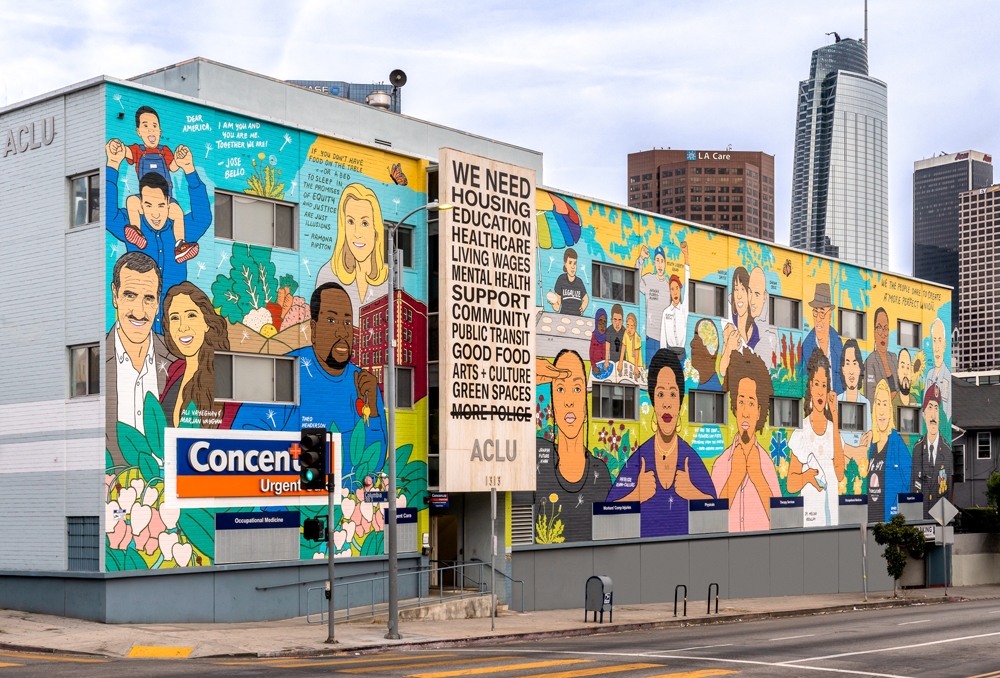When Audrey Chan began at the American Civil Liberties Union of Southern California in October 2019 as their inaugural Artist in Residence, she and the flagship ACLU affiliate had envisioned the creation of a mural commemorating their centennial on their Los Angeles office building. “The initial mural proposal, based on archival research into the affiliate’s history since 1923, was still in an exploratory phase when I shifted to working on other campaign materials and projects with the [ACLU SoCal] Communications team,” Chan wrote via email.
When disproportionately burdensome effects of COVID-19 on marginalized communities collided with global uprisings against anti-Black police brutality during the summer, discussions on activating the front façade of the building, located at the corner of W. 8th St. and Columbia Ave. in Westlake, were renewed with urgency. “The mural conversation became a priority in June, when [People’s Budget LA Coalition] organizers identified the ACLU SoCal’s facade as a site for an art action [since it is] directly across the street from the LA Police Protective League’s headquarters,” Chan disclosed.
The People’s Budget LA Coalition, led by Black Lives Matter Los Angeles (BLMLA), has organized for the last five years to redirect funding allocated to the police toward community-based services that would support rather than criminalize individuals, especially those disproportionately likely to be incarcerated. At a People’s Budget LA Coalition meeting last summer, ACLU SoCal’s Policy Counsel and Senior Organizer, Andrés Kwon, strategized with Coalition members—namely, People’s City Council LA, TransLatin@ Coalition, Ktown for All and BLMLA—about building on the momentum of civic protests to heighten focus on the LA Police Protective League’s culture of impunity. “Andrés talked with the organizers about stag[ing] an action in the form of a mural,” Chan wrote. “He brought the idea to Marcus Benigno (Chief Communications Officer & Marketing Officer, ACLU SoCal), who then proposed it to me.”

The Care We Create [detail] (2020) by Audrey Chan. Photo by Elon Schoenholz.

The Care We Create [detail] (2020) by Audrey Chan. Photo by Elon Schoenholz.
Alongside some of the mural subjects appear quotes, including one attributed to the late Ramona Ripston, who made economic justice a central issue during her tenure as ACLU SoCal Executive Director: “If you don’t have food on the table or a bed to sleep in, the promises of equity and justice are just illusions.”
United in their commitment to the intersecting needs enumerated in bold vinyl lettering above the building’s entrance, the towering individuals across the 5,500-square-foot mural gaze with unwavering resolve at the LA Police Protective League’s headquarters, as well as all passersby. At once confronting, assured, inviting and uplifting, their gazes ask, “Will we dare to work together to imagine and build structures that ensure enduring support, access and justice for all?” In alliance with their efforts is the mural’s natural scenery, also rooted in Southern California. “The park background is inspired by Kenneth Hahn State Recreation Center, and the mural subjects are surrounded by healing plants native to the region,” Chan stated.

The Care We Create (2020) by Audrey Chan. Photo by Elon Schoenholz.
Completed on December 23, 2020, the mural was painted “every night for three weeks” after the design was transferred onto the building through a pounce paper process, Chan relayed. “I recommended we work with Eder Cetina, CEO and Creative Director of Wilson Cetina Group; a recent project [of his] is Barbara Kruger’s mural Untitled (Questions) at MOCA Geffen,” Chan continued. “He is also part of LA Art Collective, who he enlists for painting projects, as many of the collective members are muralists and street artists.” Fabricators of The Care We Create alongside Cetina included Juan “Gogo” Hernandez, David “Dense” Zajdman, Keefer “Keef” Butterworth, Fernando Mendoza, Dan Boer, and Frank “Kodak” Armstead of the LA Art Collective & Wilson Cetina Group. Ana Iwataki served as an art consultant for the ACLU SoCal on the mural and throughout Chan’s residency.
Location: 1313 W. 8th St., Los Angeles, CA 90017
Mural website: https://www.aclusocal.org/care-we-create


